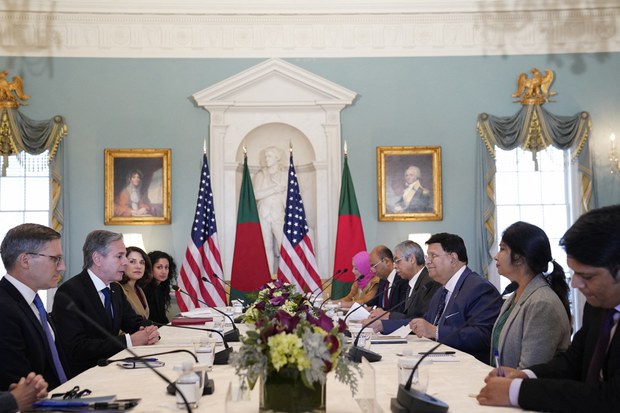US concerned about violence, intimidation against Bangladesh media before election
2023.04.11
Washington
 U.S. Secretary of State Antony Blinken (second from left) meets with Bangladesh Foreign Minister A. K. Abdul Momen (third from right) at the State Department in Washington, April 10, 2023.
U.S. Secretary of State Antony Blinken (second from left) meets with Bangladesh Foreign Minister A. K. Abdul Momen (third from right) at the State Department in Washington, April 10, 2023.
The United States has expressed concern to Bangladesh about threats and physical attacks against the media in the South Asian country, including under a draconian digital law, ahead of national elections.
U.S. Secretary of State Antony Blinken emphasized to his Bangladesh counterpart at a meeting here on Monday that an impartial and lawful election and a high regard for human rights were crucial to the bilateral relationship.
The top U.S. diplomat’s comments came hours after Bangladesh Prime Minister Sheikh Hasina lambasted Washington in parliament saying it was working to bring an undemocratic party to power in her country in the upcoming election.
In his meeting with Bangladesh Minister for Foreign Affairs A.K. Abdul Momen, Blinken reiterated the U.S. commitment to promoting freedom of expression in Bangladesh, but also touched on recent incidents of arrests and cases against journalists.
“Secretary Blinken expressed concerns about violence against and intimidation of the media and civil society, including under the Digital Security Act,” Principal Deputy Spokesman Vedant Patel said about the meeting in a statement issued Tuesday.
“He underscored that free and fair elections and respect for human rights in Bangladesh are critical as we seek to deepen our bilateral relationship.”
The Digital Security Act, passed in September 2018, the same year Hasina’s ruling Awami League came to power for a third consecutive term, gives law enforcement the power to arrest people without a warrant based merely on suspicion that a crime has been committed online.
Hasina also railed against Bangladesh national daily Prothom Alo, which last month was hit with two cases under the act, for allegedly “undermining the country’s independence” with a news report that quoted a citizen complaining about the high cost of food.
‘World’s most draconian laws for journalists’
Patel was grilled at the State Department briefing on Monday about Hasina’s comments slamming Washington and Prothom Alo, which she called an “enemy of the people.”
One journalist asked Patel to comment on Hasina’s statement that Washington was trying to force a regime change and about the cases against Prothom Alo journalists.
Patel didn’t address Hasina’s comments about the U.S. but spoke about the Digital Security Act.
“[T]he latest world freedom – World Press Freedom Index ranked Bangladesh 162 out of 180 countries, a drop of 10 places from the previous year. And one of the biggest reasons that Bangladesh scored that …is the Digital Security Act, which per our assessment is one of the world’s most draconian laws for journalists,” he told reporters.
“And we have made our concerns about this law quite clear. A free press and an informed citizenry are key for any nation and its democratic future, and we are concerned that – media and content restrictions and the impact that they might have.”
Another journalist asked about Washington’s stance on the opposition Bangladesh Nationalist Party’s demand for a “neutral” caretaker government ahead of the election scheduled for December or January 2024, to ensure a fair election.
Patel said the U.S. was looking forward to deepening its relationship with Bangladesh which is why Blinken was meeting with Momen.
“[B]roadly, the U.S. supports the principle of free and fair elections in Bangladesh and around the world, but I’m not here to endorse one political candidate or party versus another,” Patel said.
Hasina on Monday did not name which so-called undemocratic party she believed the U.S. wanted in power. She also accused Washington of supporting corrupt people in Bangladesh.
Again, Hasina did not name anyone, although the Bangladesh Nationalist Party chairwoman Khaleda Zia has been convicted in two graft cases.
The U.S. and other Western countries have in recent months urged Bangladesh more than once to ensure free and fair elections amid reports of the government muzzling critics and the opposition.
Opponents have noted that Hasina’s administration has increasingly and brazenly targeted her critics and journalists, using state machinery and oppressive laws. The issue has come to the attention of other democracies and rights groups as well.
For instance, critics of the government – mostly journalists, cartoonists, activists, entrepreneurs, educators and students – have been targeted by the Digital Security Act, analysts say.
The Center for Governance Studies, a Bangladesh think-tank, reported that about 280 journalists were accused under the act between October 2018 and August 2022, while 84 were arrested.
“The most striking highlight of the study is the clear indication that the DSA is being used to target journalists and political opponents by members of the ruling party,” the center said on its website in January, using an acronym for the act.
While figures for last year were not available, Bangladesh saw a nearly nine-fold increase in cases filed under the Digital Security Act in 2021 compared to the previous year.
These cases were filed for perceived online criticism of officials, including Hasina, and her father, the country’s founder, according to rights organizations.







